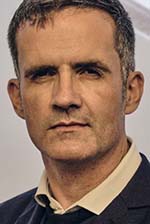Cost: £140 to £480
Book a place
Overview
This course will help you gain a good understanding of renal physiology and electrolyte and acid-base disorders. It's a three-day course but you can choose to attend for one, two or three days.
It covers the pathophysiology and clinical management of electrolyte and acid-base disorders, hypertension, and fluid management.
The course consists of a mixture of basic and applied clinical science. It should provide a useful overview of renal physiology and hopefully convince you that a basic understanding of renal physiology is both enjoyable and valuable in your clinical practice.
This course is run by the UCL Department of Renal Medicine.
Who this course is for
This course is for:
- trainees in nephrology, general (internal) medicine and intensive care medicine
- consultant nephrologists
- general physicians
Course content
The topics covered on each day are as follows:
Day one
- Overview of the nephron
- Proximal tubular function
- Distal tubular function
- Clinical tubular cases
- The aperion of arterial hypertension
- Oliver Wrong Prize Lecture (title tbc)
- Tbc
Day two
- Renal tubular acidosis
- Metabolic acidosis and alkalosis
- Acid base physiology
- Acid-base cases workshop
- Hyponatraemia
- Hypernatraemia
- IV Fluid therapy
- Sodium cases workshop
Day three
- Hypokalaemia
- Hyperkalaemia
- Hypophosphataemia
- Magnesium disorders
- Calcium disorders
- Phosphate, magnesium, potassium, and calcium cases workshops
- Diuretics
- Online MCQs
Teaching and structure
You can attend one, two or three days.
Each day will involve face-to-face lectures and case discussions from international physiology and nephrology experts.
This is an interactive course and we encourage you to ask questions, bring your own clinical queries or cases and chat informally with our speakers during breaks.
Certificates and accreditation
You'll receive a certificate of attendance.
CPD credit to be confirmed by the Royal College of Physicians (RCP). We anticipate the course will be awarded 18 category 1 (external) CPD.
Learning outcomes
The course will help you:
- understand the principles of acid-base and renal electrolyte physiology
- evaluate and treat common and traditionally difficult clinical problems such as hyponatraemia and metabolic acidosis
- practice clinical physiology cases with world-expert clinicians in dedicated workshops
- gain expertise with fluid and diuretic therapies
- critically reflect on ways to improve current practice and the patient pathway
Costs and concessions
An early bird discount is available for bookings made before 31 January 2024.
The fees per day are:
- SpR/trainee grade - £225 (£185 early bird price)
- Consultants - £240 (£200 early bird price)
- RFH/UCLH/UCL staff - £140 (£115 early bird price)
The fees for two days are:
- SpR/trainee grade - £350 (£310 early bird price)
- Consultants - £365 (£325 early bird price)
- RFH/UCLH/UCL staff - £250 (£200 early bird price)
The fees for three days are:
- SpR/trainee grade - £465 (£450 early bird price)
- Consultants - £480 (£465 early bird price)
- RFH/UCLH/UCL staff - £390 (£370 early bird price)
Course team

Prof Stephen (Ben) Walsh
Ben is a clinician scientist with an interest in both rare renal tubular disorders and disorders of blood pressure. He leads a specialist national clinic for patients with inherited and acquired renal tubular disease.
His research involves the physiology of renal epithelial sodium and other solute transport, and how that relates to blood pressure homeostasis, in rare genetic (Gitelman and Gordon syndromes, distal Renal Tubular Acidosis) as well as common (hypertension, metabolic syndrome) diseases. His laboratory group uses physiological and imaging methods with cell and animal models as well as human subjects.

Prof Matthew Bailey
Matthew is Professor of Renal Physiology in the British Heart Foundation Centre for Cardiovascular Science at the University of Edinburgh and a Fellow of The Royal Society of Biology. He has a PhD from The University of London, received postdoctoral training at UCL and CNRS in Saclay, France and held Wellcome Trust Fellowships at Yale University and the University of Edinburgh. Matt's team examines the physiology of salt balance and is funded by the British Heart Foundation, Kidney Research UK, Diabetes UK and the Medical Research Council.

Dr Rhys Evan
Rhys is a consultant nephrologist and honorary associate professor in the UCL department of renal medicine. He was an undergraduate at Cambridge University, undertook general nephrology training in London, and he subsequently completed a Fellowship in Transplantation at the University of British Columbia. He returned to the Royal Free in November 2021 where he works clinically as a transplant nephrologist. Rhys undertook his PhD at UCL under the supervision of Prof Alan Salama and Prof Stephen Walsh. His research is focused on the impact of the extracellular ionic environment on immune cell activation with a particular focus on changes in immunity that occur in states of altered sodium balance. He recently provided the first report of immunodeficiency in patients with Salt-Losing Tubulopathy. He has just received funding to explore the effect of sodium on the alloimmune response.
Book a place
Course information last modified: 26 Jan 2024, 12:39
 Close
Close

